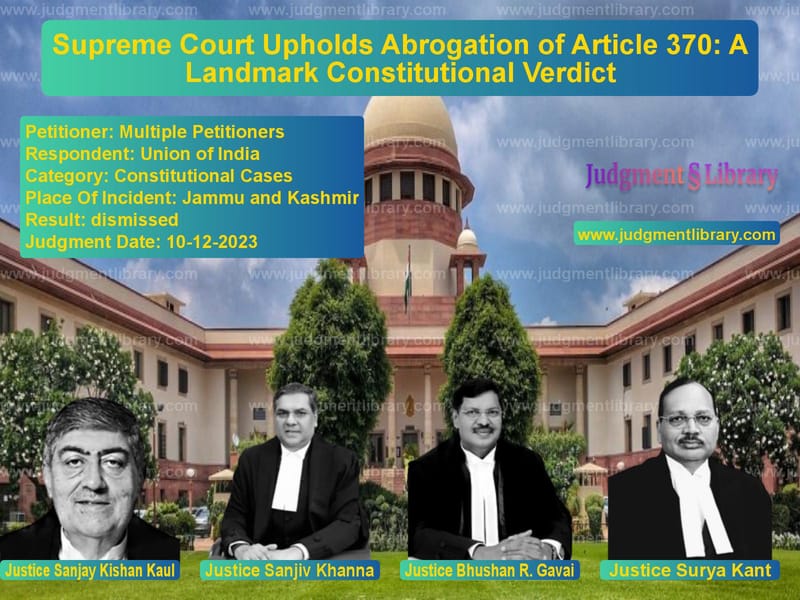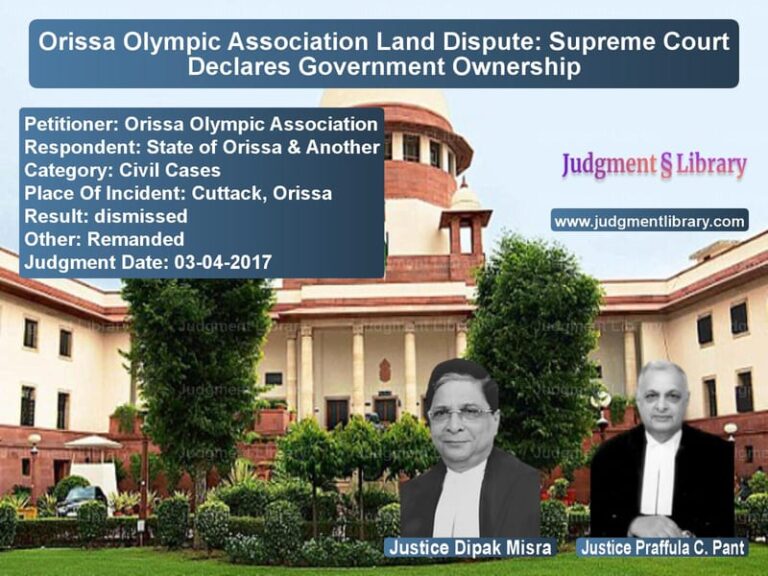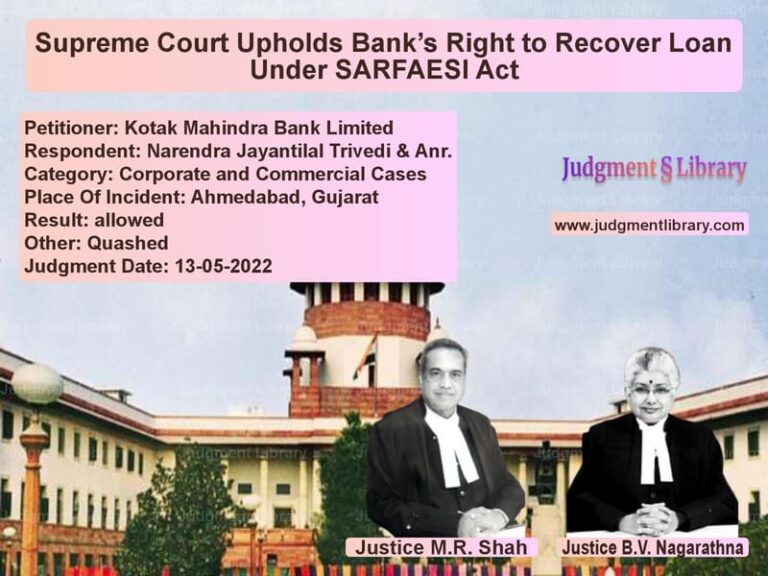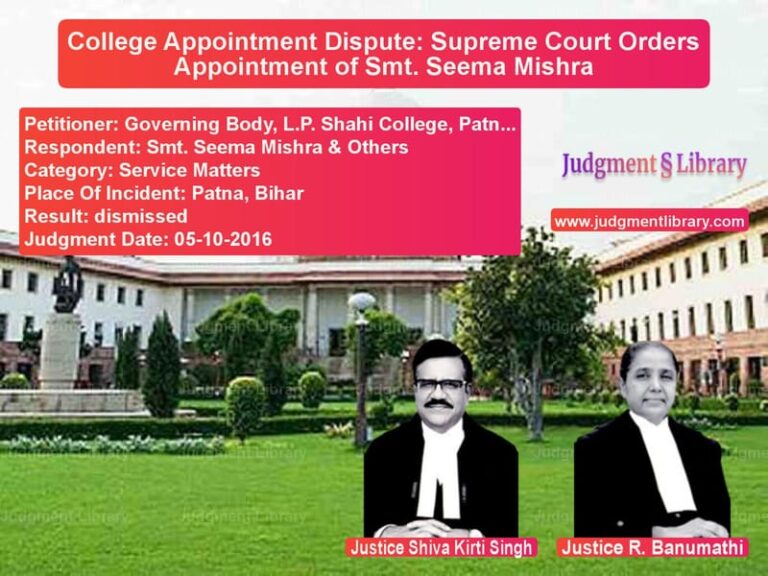Supreme Court Upholds Abrogation of Article 370: A Landmark Constitutional Verdict
The case concerning the abrogation of Article 370 of the Indian Constitution was one of the most historic and widely debated constitutional matters in India’s legal history. The Supreme Court’s ruling on December 11, 2023, determined the validity of the constitutional amendments and executive orders that led to the revocation of Jammu and Kashmir’s special status and its reorganization into two Union Territories.
The petitions challenged the manner in which Article 370 was abrogated, the role of the President and Parliament, and the implications for federalism and democracy in India. The Supreme Court, in a detailed and unanimous judgment, upheld the central government’s decisions, affirming that the special status of Jammu and Kashmir was temporary and could be revoked by constitutional means.
Background of the Case
Article 370 granted Jammu and Kashmir special status, allowing it to have its own Constitution, separate flag, and autonomy over internal affairs except in defense, foreign affairs, and communications. This special status was revoked in August 2019 through Constitutional Orders 272 and 273, issued under the President’s powers, along with the passage of the Jammu and Kashmir Reorganization Act, 2019, which bifurcated the state into two Union Territories: Jammu & Kashmir and Ladakh.
Several petitions were filed challenging this decision on the grounds that:
- The President had no authority to revoke Article 370 in the absence of the Jammu and Kashmir Constituent Assembly.
- The Jammu and Kashmir Reorganization Act was unconstitutional as it converted a full-fledged state into a Union Territory.
- The process violated India’s federal structure and undermined democratic representation.
Arguments of the Petitioners
1. Constitutional Violation
The petitioners, including legal luminaries like Kapil Sibal, Gopal Subramanium, and Rajeev Dhavan, argued that the abrogation was unconstitutional. They contended:
- The dissolution of Jammu and Kashmir’s Constituent Assembly in 1957 meant that Article 370 had become a permanent feature.
- Replacing the Constituent Assembly’s recommendation with the Parliament’s was an unconstitutional modification of Article 370.
- The state’s consent was required to revoke Article 370, which was not obtained.
2. Federalism and Democratic Rights
They also argued that Jammu and Kashmir’s unique status was a foundational part of India’s federalism. The unilateral decision by the central government undermined the principle of cooperative federalism.
Arguments of the Government
The central government, represented by Attorney General R. Venkataramani and Solicitor General Tushar Mehta, argued that:
- Article 370 was a temporary provision, as indicated in its title and placement in the Constitution.
- The President had full authority to abrogate Article 370 as per the power vested in Article 370(3).
- Jammu and Kashmir was fully integrated into India, and special provisions were no longer necessary.
- The reorganization was done in the national interest, ensuring equal rights and governance for all residents.
Supreme Court’s Ruling
The Constitution Bench, led by Chief Justice D.Y. Chandrachud, along with Justices Sanjay Kishan Kaul, Sanjiv Khanna, Bhushan R. Gavai, and Surya Kant, upheld the abrogation of Article 370, making the following key observations:
1. Article 370 Was Temporary
The Court ruled that Article 370 was meant to be a temporary provision, subject to modification or abrogation by the President. The dissolution of the Jammu and Kashmir Constituent Assembly did not make it permanent.
2. No Sovereignty Retained by Jammu and Kashmir
Rejecting the argument that Jammu and Kashmir retained any sovereignty post-1947, the Court emphasized that the state fully merged with India after the Instrument of Accession was signed.
3. Presidential Powers Were Lawful
The Supreme Court affirmed that the President had the power to amend Article 370 under the Indian Constitution, and that Parliament’s role was constitutionally valid.
4. Jammu and Kashmir Reorganization Act Is Valid
The Court ruled that Parliament had the authority to reorganize the state and create Union Territories under Article 3 of the Constitution.
Impact of the Judgment
The verdict has profound implications:
- It confirms that no Indian state can claim separate sovereignty.
- It allows full implementation of Indian laws and governance in Jammu and Kashmir.
- It sets a precedent for future constitutional amendments concerning state autonomy.
The judgment marks a new chapter in India’s constitutional history, affirming the central government’s authority in national integration efforts while reinforcing the principle of federalism within a unified India.
Petitioner Name: Multiple Petitioners.Respondent Name: Union of India.Judgment By: Justice D.Y. Chandrachud, Justice Sanjay Kishan Kaul, Justice Sanjiv Khanna, Justice Bhushan R. Gavai, Justice Surya Kant.Place Of Incident: Jammu and Kashmir.Judgment Date: 10-12-2023.
Don’t miss out on the full details! Download the complete judgment in PDF format below and gain valuable insights instantly!
Download Judgment: multiple-petitioners-vs-union-of-india-supreme-court-of-india-judgment-dated-10-12-2023.pdf
Directly Download Judgment: Directly download this Judgment
See all petitions in Fundamental Rights
See all petitions in Constitution Interpretation
See all petitions in Legislative Powers
See all petitions in Public Interest Litigation
See all petitions in Judgment by Dhananjaya Y Chandrachud
See all petitions in Judgment by Sanjay Kishan Kaul
See all petitions in Judgment by Sanjiv Khanna
See all petitions in Judgment by B R Gavai
See all petitions in Judgment by Surya Kant
See all petitions in dismissed
See all petitions in supreme court of India judgments December 2023
See all petitions in 2023 judgments
See all posts in Constitutional Cases Category
See all allowed petitions in Constitutional Cases Category
See all Dismissed petitions in Constitutional Cases Category
See all partially allowed petitions in Constitutional Cases Category







